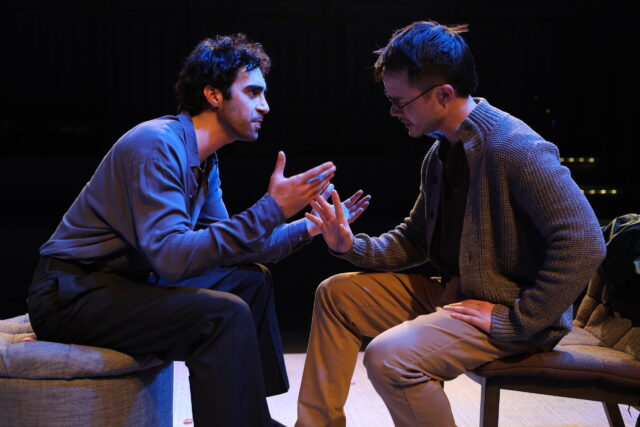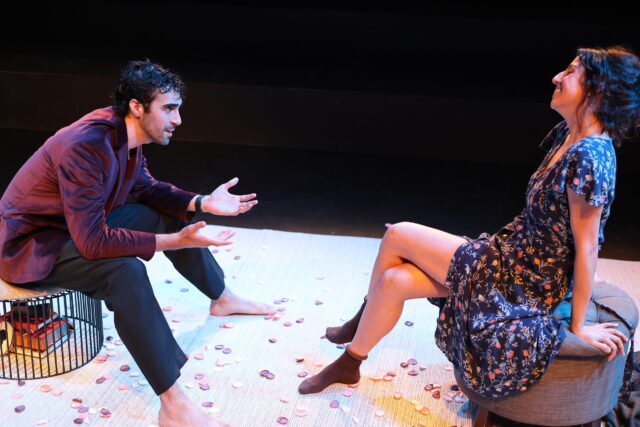
Robert Hand (Rodd Cyrus) and Richard Rowan (Jeffrey Omura) are in love with the same woman in James Joyce’s only published play (photo by George Vail)
EXILES
Jeffrey and Paula Gural Theatre
A.R.T./NY Theatres
502 West Fifty-Third St. between Tenth & Eleventh Aves.
Wednesday – Sunday through March 15, $25-50
www.themaptheater.com/whats-on
Dublin-born writer James Joyce revolutionized literature with such novels as Ulysses, Finnegans Wake, and A Portrait of the Artist as a Young Man. It is little known that he published a single play, Exiles, an intriguing and frustrating work that is currently having its first New York City revival in nearly half a century, staged by the MAP Theater at the Jeffrey and Paula Gural Theatre through March 15. (He reportedly destroyed his only other play, the five-act A Brilliant Career.) While the semiautobiographical work does not revolutionize live drama, it proves to be more than just a side note in Joyce’s history.
Written in 1914–15, Exiles was inspired by the author’s seven-month sojourn to Rome and features characters loosely based on Joyce himself; his wife, Nora Barnacle; his friend Oliver St. John Gogarty; and Vincent Cosgrove, a suitor of Nora’s. It takes place in the summer of 1912, nine years after journalist Robert Hand (Rodd Cyrus) and writer Richard Rowan (Jeffrey Omura) both fell for Bertha (Layla Khoshnoudi), but Richard won her heart — and also impregnated her, causing a scandal. Richard has just finished a book about Robert’s former fiancée Beatrice Justice (Violeta Picayo), who Richard was in love with when he met Bertha. Beatrice teaches music to Richard and Bertha’s son, Archie (Mattie Tindall), a happy child who runs around with glee.
Richard, a dour, humorless man, and Robert, a flamboyant, Byronic figure, are best friends and rivals at the same time. One afternoon Robert stops by Richard and Bertha’s home and finds Beatrice there. “Oh, but I’m sorry I did not know you were coming. I would have met you at the train. Why did you do it? You have some queer ways about you, Beatty, haven’t you?” Robert, carrying flowers for Bertha, ask Beatrice, who coldly responds, “Thank you, Robert. I am quite used to getting about alone.”
Beatrice exits, leaving Bertha with Robert, who poetically proclaims his desire for Richard’s wife, who drinks it all in, returning the flirtation. Robert asks if she can kiss her hand, and she holds it out for him. He asks to kiss her eyes and she obliges. He inquires about kissing her mouth and she replies, “Take it.”
Richard arrives, pretending he does not know what is going on between them. Robert has helped get Richard invited to a dinner with the vicechancellor, where they can discuss the open chair of romance literature at the university. They speak of Robert’s cottage, where he and Richard had some wild times with a bevy of women when they were younger. “It was not only a house of revelry; it was to be the hearth of a new life. And in that name all our sins were committed,” Richard says. Robert answers, “I have no remorse of conscience. Maybe you have.”
Having arranged that Richard will be busy that night, Robert makes a secret rendezvous with Bertha, imploring her to come to the cottage so they can consummate their desire. After Robert leaves, Bertha tells Richard everything; he wants to know every detail, and he listens without jealousy but with a touch of excitement, or at least as excited as he ever gets.
Calling Robert “a liar, a thief, and a fool,” Richard encourages Bertha to go. “You forget that I have allowed you complete liberty — and allow you it still,” Richard says, the first of many times he does so. Bertha gives Richard the opportunity to tell him not to visit Robert, asking if he will blame her if she goes, but Richard proclaims with little emotion, “No, no! I will not blame you. You are free. I cannot blame you.”
It’s a key moment in the narrative, complicating the audience’s relationships with the main characters in a drawing room morality play without a moral. Bertha does indeed go to the cottage — but so does Richard.

Robert (Rodd Cyrus) declares his love for the married Bertha (Layla Khoshnoudi) in Exiles (photo by George Vail)
Adapted and gracefully directed by Zachary Elkind, Exiles is a post-Victorian intellectual soap opera that evokes the love triangle in François Truffaut’s 1962 Jules et Jim and the partner-swapping in Paul Mazursky’s 1969 Bob & Carol & Ted & Alice, tinged with the J. Geils Band’s 1980 hit “Love Stinks,” in which Peter Wolf sings, “You love her / But she loves him / And he loves somebody else / You just can’t win / And so it goes / ’Til the day you die / This thing they call love / It’s gonna make you cry.”
There may not be any tears in Exiles, but there aren’t a whole lot of laughs either. For all the freedom Richard keeps talking about, the adult characters are constrained by social mores, while the fun-loving Archie always has a smile on his face and a bounce in his step, too young to know of life’s many ills.
Cate McCrea’s set is a horizontal space with the audience sitting in three rows of rafters on either of the long sides. At each end is a white curtain and a chair, with two small, round ottomans in the middle, one oddly containing a pile of books and a few other objects. Amara McNeil’s lighting stays fairly bright throughout, so everyone in the audience is visible. Alyssa Korol’s contemporary costumes are highlighted by Bertha’s sexy flower-print dress.
Khoshnoudi is alluring as Bertha; it’s easy to see why everyone is in love with her. Omura, wearing wire-rim glasses that make him resemble Joyce, and Cyrus are each fine individually but don’t quite connect; it is difficult to imagine Richard and Robert were ever close friends. Picayo does what she can with the underwritten Beatrice, who is more of a plot device, while Tindall injects much-needed energy switching between Archie and Brigid, the Rowans’ servant.
Even at a trim ninety minutes, the show gets repetitive, but Exiles is no mere curiosity; it is an intelligent work written by a man at the peak of his abilities, exploring the idea of free love and open marriage in that brief window around the First World War, decades before they were to become hot topics in movies and on daytime television.
[Mark Rifkin is a Brooklyn-born, Manhattan-based writer and editor; you can follow him on Substack here.]